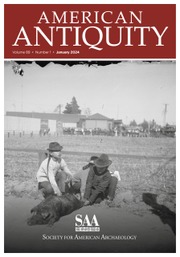I am introducing three more members of the American Antiquity (AAQ) Editorial Board. These dedicated individuals work tirelessly to help shape the mission and vision of the journal. After having introduced Stephen Acabado (UCLA), Sabrina Agarwal (Berkeley) and Michael Blakey (William and Mary), this column focuses on Lewis Borck (University of Oklahoma), Craig Cipolla (Tufts) and Alan Farahani (SciScope Solutions).
Lewis Borck started his academic journey in community college and received his PhD from the University of Arizona in 2016. He is an assistant professor of Native American Studies and the Horizon Chair of Native American History and Culture at the University of Oklahoma, Norman. His research focuses on Indigenous rebellions, revolutions, and social movements that are missed or erased by archaeologists (Borck and Clark Reference Borck, Clark, Thurston and Fernández-Götz2021) as well as how settler colonialism impacts heritage decisions and the construction of history (Borck Reference Borck2019). He is a founding member of the Black Trowel Collective, a founding committee member of their microgrants mutual aid project for BIPOC and working-class archaeology students, and the founding president for The History Underground, an organization working to lower barriers for students from historically excluded communities entering archaeology and heritage work. His current research is in collaboration with the Jicarilla Apache Nation's Tribal Historic Preservation office in northern New Mexico.
Craig N. Cipolla received his PhD from the University of Pennsylvania in 2010. He is currently an assistant professor of anthropology at Tufts University. He has held academic positions in the United States, the UK, and Canada (spending time at the latter as a curator of North American archaeology). His research focuses on Indigenous-colonial histories of New England and the Great Lakes, addressing issues of colonialism, collaborative methodologies, and archaeological theory. He has recently published several books, such as Archaeological Theory in the New Millennium: Introducing Current Perspectives (Harris and Cipolla Reference Harris and Cipolla2017) and Archaeological Theory in Dialogue: Situating Relationality, Ontology, Posthumanism, and Indigenous Paradigms (Crellin et al. Reference Crellin, Cipolla, Montgomery, Harris and Moore2020). He directs the Mohegan Archaeological Field School, a collaborative project with the Mohegan Tribe of Connecticut, which focuses on historic colonial interactions and allows students to gain experience with collaborative Indigenous archaeology.
Alan Farahani received his PhD from an interdisciplinary archaeology and history program (AHMA) at the University of California, Berkeley, in 2014. He was a Cotsen Institute of Archaeology Postdoctoral Fellow at the University of California, Los Angeles from 2014 to 2018, and assistant professor of anthropology at the University of Nevada, Las Vegas , from 2018 until 2021. He is currently the founder of and analyst at SciScope Solutions, where he uses open-source programming platforms to design computational tools to facilitate the entry, organization, analysis, and visualization of data collected in the laboratory and field sciences, above all in anthropology and archaeology. His research interests lie in the socio-ecology of past foodways, using paleoethnobotany to study the mutual constitution of social organization and environment in the maintenance of agricultural strategies in the Holocene (Farahani Reference Farahani2018, Reference Farahani, Hollander and Howe2021). He has conducted fieldwork in Armenia, Jordan, Iraqi Kurdistan, the Philippines, Tunisia, and Spain, as well as participating in projects from Las Capas, Arizona, and Joya de Ceren, El Salvador. Finally, he prioritizes transparency and integrity in research through the reproducibility of quantitative analyses.


